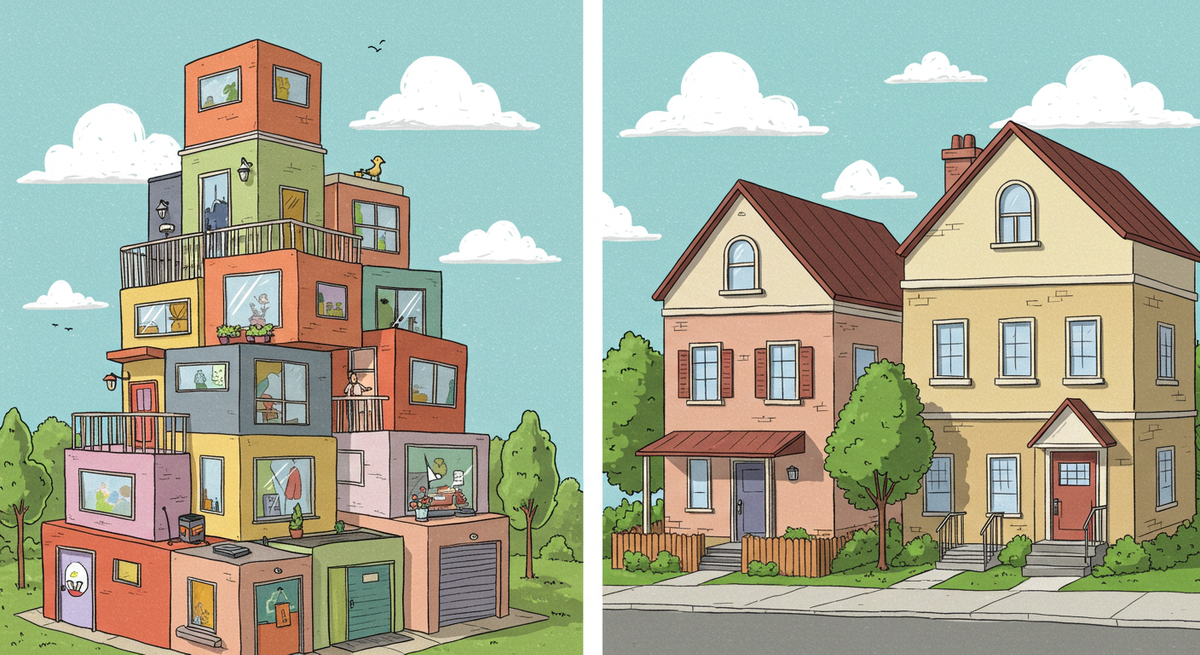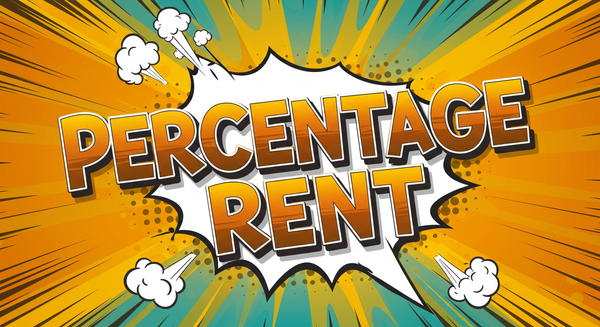Condominium vs. Townhouse Property Management: A Complete Guide for Landlords and Investors
You'll learn: What distinguishes condo ownership from townhouse ownership, how these differences impact property management operations, legal compliance requirements, and proven strategies for maximizing returns in each property type

Property managers and real estate investors face a critical decision when building their portfolios: should they focus on condominium or townhouse properties? This choice fundamentally shapes management strategies, financial structures, and operational responsibilities. Understanding the key differences between condo vs townhouse ownership models is more than architecture... it's understanding how two distinct approaches to multi-unit property management work.
In this article you'll learn: What distinguishes condo ownership from townhouse ownership, how these differences impact property management operations, legal compliance requirements, and proven strategies for maximizing returns in each property type.
What Are Condominiums and Townhouses?
Condominium ownership represents a unique legal structure where condo owners hold title to their individual unit while sharing ownership of common areas with other residents. According to Hawaii's Real Estate Commission, "the word 'condominium' comes from two Latin words meaning common ownership or control" and "describes a legal form of ownership and not a type of building or residence." This means a condo can exist in various architectural forms, from high-rise towers in New York City to townhome-style developments in suburban markets.
Townhouse ownership, by contrast, typically involves fee-simple ownership where townhouse owners hold title to both their unit and the underlying land. Los Angeles County Public Works defines a townhouse as "a single-family dwelling unit constructed in a group of three or more attached units in which each unit extends from the foundation to roof with open space on at least two sides." This ownership structure gives townhome owners greater control over their property's exterior and outdoor space.
The Cornell Law School Legal Information Institute clarifies that condominiums are "a type of residential common interest development where each member owns the title to their unit" with "a membership in the governing association." This creates fundamentally different management paradigms. While condo owners share responsibility for common spaces and shared amenities, townhouse owners typically manage their own exterior maintenance and lawn care.
Why Ownership Structure Matters in Property Management
The distinction between condo and townhouse ownership directly impacts your property management operations, financial planning, and investor returns. Condo ownership involves mandatory participation in a condo association or homeowners association, which collects monthly fees to maintain common areas, shared spaces, and building infrastructure. These HOA dues create predictable revenue streams but require sophisticated reserve fund management and governance oversight.
Townhouse ownership typically offers more autonomy over exterior upkeep and property modifications. Townhome owners often handle their own homeowners insurance, lawn care, and exterior maintenance, reducing the collective management burden but requiring more hands-on property oversight. This difference significantly affects your role as a property manager or investor.
Research from the National Association of Realtors indicates that "condos are often cheaper than townhouses because they come with no land; the exterior and land are considered common areas shared by all residents." This price differential creates different investment opportunities and risk profiles that savvy real estate investing professionals must understand.
Real-World Applications in Property Management
Example 1: Urban High-Rise Condo Management
- Challenge: Managing a 200-unit condo building in New York City with extensive shared amenities including fitness center, rooftop deck, and concierge services
- Solution: Implemented professional property management with specialized expertise in condo association governance, reserve fund management, and vendor coordination for common area maintenance
- Outcome: Increased property values by 15% over three years through proactive maintenance and amenity upgrades
- Takeaway: Condo complex management requires specialized skills in collective decision-making and financial planning
Example 2: Suburban Townhouse Community
- Challenge: 50-unit townhome development where owners struggled with inconsistent exterior maintenance and landscaping standards
- Solution: Established a home owners association with architectural guidelines and professional landscaping services for common spaces
- Outcome: Improved curb appeal and property values while maintaining individual ownership autonomy
- Takeaway: Townhouse owner communities benefit from balanced governance that preserves individual control while ensuring community standards
Example 3: Mixed-Use Development Conversion
- Challenge: Converting a larger building from rental apartments to condo ownership while maintaining retail tenants
- Solution: Created a complex governance structure separating residential condo community management from commercial lease administration
- Outcome: Successfully transitioned 75% of units to owner-occupied while maintaining rental income from remaining units
- Takeaway: Condo vs townhouse decisions often involve complex legal and financial considerations requiring professional expertise
Legal and Compliance Considerations
Federal and State Regulations
The Uniform Common Interest Ownership Act (UCIOA) provides the foundational legal framework for condominium management across multiple jurisdictions. Montana's legislative documentation reveals that UCIOA "combined, in a single comprehensive law, prior uniform laws" including condominium, planned community, and cooperative acts. This creates standardized governance requirements for condo associations but allows state-level variations that property managers must navigate.
Townhouse developments face different regulatory frameworks depending on size and structure. The North Carolina Real Estate Commission notes that "townhouse projects of more than 20 units and created on or after January 1, 1999 are covered by the Planned Community Act," while smaller developments may be "governed by the same general laws that govern single-family homes."
Documentation and Disclosure Requirements
Condo ownership involves extensive documentation requirements including operating budgets, insurance summaries, and balance sheets. The Texas Real Estate Commission mandates specific disclosure certificates prepared "no more than three months before the date it is delivered to Buyer." These requirements create ongoing administrative burdens but provide transparency for home buyers and real estate agents.
Townhome owners typically face simpler documentation requirements but must ensure compliance with local zoning, building codes, and any homeowners association covenants. Property managers must understand these distinctions to avoid legal pitfalls and ensure proper disclosure to prospective buyers and tenants.
Best Practices for Property Management Success
1. Understand Your Ownership Model Completely
- What it is: Master the legal and financial implications of your specific ownership structure
- Why it matters: Condo vs townhouse distinctions affect everything from insurance requirements to maintenance responsibilities
- How to do it: Review governing documents, consult with legal counsel, and understand state-specific regulations
- Tools to use: Legal document management systems and compliance tracking software
2. Implement Proactive Financial Planning
- What it is: Develop comprehensive reserve fund strategies and fee structures that match your property type
- Why it matters: Condo associations require sophisticated reserve planning while townhouse communities may need different approaches
- How to do it: Conduct regular reserve studies, implement graduated fee increases, and maintain transparent financial reporting
- Tools to use: Professional reserve study consultants and property management accounting software
3. Establish Clear Communication Protocols
- What it is: Create systematic communication channels between management, owners, and residents
- Why it matters: Condo living requires more collective decision-making while townhouse owner communities need different engagement strategies
- How to do it: Use digital platforms for notices, maintain regular board meetings, and provide clear escalation procedures
- Tools to use: Property management software with owner portals and communication modules
4. Maintain Professional Vendor Networks
- What it is: Develop relationships with contractors and service providers who understand your property type
- Why it matters: Shared amenities and common areas require specialized maintenance expertise
- How to do it: Vet contractors for experience with your property type, establish service agreements, and maintain performance standards
- Tools to use: Vendor management platforms and performance tracking systems
5. Stay Current with Industry Standards
- What it is: Keep up with evolving best practices, legal requirements, and technology solutions
- Why it matters: The Community Association Institute and other professional organizations regularly update guidance following incidents like the Surfside collapse
- How to do it: Attend industry conferences, maintain professional certifications, and subscribe to relevant publications
- Tools to use: Professional association memberships and continuing education programs
Related Concepts and Terminology
Planned Unit Development (PUD): A zoning classification that allows mixed housing types within a single development, often incorporating both condo and townhouse units with shared governance structures.
Common Interest Community: A broader legal term encompassing condominiums, planned communities, and cooperatives where owners share responsibility for common areas and amenities.
Homeowners Association (HOA): The governing body responsible for managing common areas, enforcing covenants, and collecting fees in both condo and townhouse communities.
Reserve Fund: Money set aside for major repairs and replacements of common elements, typically required by law in condo associations and increasingly common in townhouse communities.
Architectural Review Committee: A body that reviews and approves changes to unit exteriors, more common in townhouse developments where owners have greater control over their property's appearance.
Common Questions About Condo vs Townhouse Management
What's the main difference between managing condos and townhouses?
Condo management focuses heavily on collective decision-making, shared facility maintenance, and complex financial planning for common areas. Townhouse management typically involves more individual owner autonomy with selective community oversight for shared spaces and architectural standards.
How do insurance requirements differ between property types?
Condo owners typically need HO-6 policies covering personal property and unit interiors, while the condo association maintains master policies for common areas. Townhouse owners usually need standard homeowners insurance (HO-3) covering both structure and personal property, similar to a detached home.
Which property type offers better investment returns?
Investment returns depend on location, market conditions, and management quality rather than property type alone. Condos often have lower entry costs but ongoing HOA dues, while townhouses may require higher initial investment but offer more control over expenses and improvements.
Can I convert between condo and townhouse ownership?
Conversion is possible but complex, requiring legal restructuring, new financing, and often unanimous or super-majority owner approval. The process involves significant legal and financial costs that make conversions relatively rare.
How do I know if a property is a good fit for my management style?
Consider your expertise in collective governance (condo associations), preference for hands-on versus delegated management, and comfort with complex financial planning. Condo management requires strong organizational and communication skills, while townhouse management may suit those preferring more straightforward property oversight.
Key Takeaways for Property Management Success
- Ownership structure drives management strategy: Condo vs townhouse distinctions create fundamentally different operational requirements, from financial planning to maintenance responsibilities
- Legal compliance varies significantly: Understanding state and local regulations for each property type prevents costly violations and ensures proper governance
- Financial planning requires specialized expertise: Condo associations need sophisticated reserve fund management while townhouse communities may require different approaches
- Professional networks matter: Building relationships with contractors, legal counsel, and industry professionals who understand your specific property type improves outcomes and reduces risks
Mastering these distinctions positions you for success whether you're managing a condo complex in urban areas or a townhome community in suburban markets. The key is matching your management approach to the ownership structure and legal requirements of your specific property type.
For additional resources on property management best practices, explore our comprehensive guides on common area maintenance, understanding cap rates, and build-to-rent communities. Professional property managers can also benefit from our property management dictionary for industry terminology and best practices.
Ready to optimize your property management strategy? Understanding the nuances between condo and townhouse ownership is just the beginning—consistent application of these principles will help you build a more profitable and sustainable property management business.





